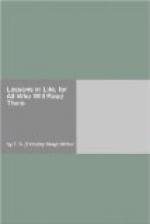The end united them. But after Florence had broken away from the toils they had been throwing around her, and they became satisfied from the strong independent letters which she sent home, that all hope of bending her to their wishes was at an end, the true character of each began to show itself more fully.
Mrs. Linden had an imperious will. She had always exercised over her children a rigid control, at the same time that in their earlier years she had won their affections. The freedom of mature years, and the sense of individual responsibility which it brings, caused all of them to rebel against the continued exercise of parental domination. In the case of Charles and Florence, the effect was a broad separation. William had sinister ends to gain in yielding a passive obedience to his mother’s will. When the bulk of her property was transferred to him, those ends were gained, and he felt no longer disposed to suffer any encroachment upon his freedom. In one act of obedience he had fulfilled all obligations of filial duty, and was not disposed to trouble himself further. He had consented to give up his father’s name, and to marry a woman for whom he had no affection, to please his mother and get an estate. The estate set off against these balanced the account; and now, there being nothing more to gain, he had nothing more to yield. When, therefore, after the design of marrying Florence to a man of “good family” had failed, the first effort on the part of his mother to exercise control over him was met in a very decided way. His wife, likewise, showed a disposition to make her keep in her own place. She was mistress in the house now, and she let it be clearly seen. It was not long before the mother’s eyes were fully open to the folly she had committed. But true sight had come too late. Reflection on the ungratefulness of her children aroused her indignation, instead of subduing her feelings. An open rupture ensued, and then came a separation. Mrs. Linden left the house of her son—but a short time before it was her own house—and took lodgings in the family of an old friend, with a heart full of bitterness toward her children. In Antoinette she had been miserably disappointed. A weak, vain, passionate, selfish creature, she had shown not the slightest regard for Mrs. Linden, but had exhibited toward her a most unamiable temper.
When it was communicated to Antoinette by her husband that his mother had left them, she tossed her head and said—“I’m glad to hear it.”
“No, you must not say that,” was William’s reply, with an effort to look serious and offended.
“And why not? It’s the truth. She has made herself as disagreeable as she could, ever since we were married, and I would be a hypocrite to say that I was not glad to be rid of her.”
“She is my mother, and you must not speak so about her,” returned William, now feeling really offended.
“How will you help it, pray?” was the stinging reply. And the ill-tempered creature looked at her husband with a curl of the lip.




